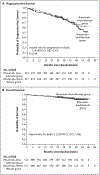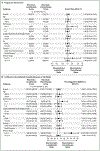Rituximab plus Lenalidomide in Advanced Untreated Follicular Lymphoma
- PMID: 30184451
- PMCID: PMC11003525
- DOI: 10.1056/NEJMoa1805104
Rituximab plus Lenalidomide in Advanced Untreated Follicular Lymphoma
Abstract
Background: Rituximab plus chemotherapy has been shown to be effective in patients with advanced-stage, previously untreated follicular lymphoma; nevertheless, most patients will have a relapse. Combination immunotherapy with lenalidomide and rituximab is an immunomodulatory regimen that has shown promising activity in patients with indolent B-cell non-Hodgkin's lymphoma.
Methods: We conducted this multicenter, international, phase 3 superiority trial to evaluate rituximab plus lenalidomide, as compared with rituximab plus chemotherapy, in patients with previously untreated follicular lymphoma. Patients were randomly assigned to receive one of the two regimens, followed by maintenance monotherapy with rituximab. Treatment with rituximab plus lenalidomide consisted of 18 cycles of the two drugs, followed by rituximab maintenance therapy every 8 weeks for 12 cycles (six additional doses). Treatment with rituximab plus chemotherapy consisted of the investigator's choice of one of three rituximab-based regimens, followed by maintenance monotherapy with rituximab every 8 weeks for 12 cycles. The primary end points were complete response (confirmed or unconfirmed) at 120 weeks and progression-free survival.
Results: A total of 1030 patients were randomly assigned to receive rituximab plus lenalidomide (513 patients) or rituximab plus chemotherapy (517 patients). The rate of confirmed or unconfirmed complete response at 120 weeks was similar in the two groups: 48% (95% confidence interval [CI], 44 to 53) in the rituximab-lenalidomide group and 53% (95% CI, 49 to 57) in the rituximab-chemotherapy group (P=0.13). The interim 3-year rate of progression-free survival was 77% (95% CI, 72 to 80) and 78% (95% CI, 74 to 82), respectively. A higher percentage of patients in the rituximab-chemotherapy group had grade 3 or 4 neutropenia (32% vs. 50%) and febrile neutropenia of any grade (2% vs. 7%), and a higher percentage of patients in the rituximab-lenalidomide group had grade 3 or 4 cutaneous reactions (7% vs. 1%).
Conclusions: Among patients with previously untreated follicular lymphoma, efficacy results were similar with rituximab plus lenalidomide and rituximab plus chemotherapy (with both regimens followed by rituximab maintenance therapy). The safety profile differed in the two groups. (Funded by Celgene; RELEVANCE ClinicalTrials.gov numbers, NCT01476787 and NCT01650701 , and EudraCT number, 2011-002792-42 .).
Conflict of interest statement
Dr. Morschhauser reports receiving advisory board fees and lecture fees from Celgene and Roche, lecture fees from Janssen, advisory board fees from Bristol-Myers Squibb, and consulting fees, advisory board fees, and lecture fees from Gilead; Dr. Fowler, receiving grant support, consulting fees, and advisory fees from Roche, Celgene, and AbbVie, consulting fees and advisory fees from Merck, and grant support from Janssen; Dr. Feugier, receiving lecture fees and fees for serving on a speakers’ bureau from Roche, Celgene, Janssen, AbbVie, and Gilead; Dr. Tilly, receiving grant support and advisory board fees from Celgene, advisory board fees and travel support from Roche, advisory board fees from Karyopharm and AstraZeneca, and lecture fees from Bristol-Myers Squibb; Dr. Palomba, receiving consulting fees and advisory board fees from Merck and Pharmacyclics; Dr. Libby, receiving grant support from the University of Washington; Dr. Casasnovas, receiving grant support, advisory board fees, honoraria, and travel support from Roche, Gilead, and Takeda, advisory board fees, honoraria, and travel support from Bristol-Myers Squibb, Merck Sharp and Dohme, and Celgene, and advisory board fees and honoraria from AbbVie; Dr. Flinn, receiving research funding from Agios, ArQule, BeiGene, Calithera, Constellation, Curis, Forma, Forty Seven, Genentech, Gilead, Incyte, Infinity, Janssen, Kite Pharma, Merck, Novartis, Pfizer, Pharmacyclics, Portola, Seattle Genetics, Takeda, TG Therapeutics, Trillium, and Verastem; Dr. Haioun, receiving advisory board fees from Amgen, Janssen, Gilead, Novartis, and Takeda; Dr. Ysebaert, receiving grant support and fees for serving on a board from Janssen and Roche, and fees for serving on a board from Gilead and AbbVie; Dr. Bartlett, receiving grant support from Affimed, Bristol-Myers Squibb, Celgene, Dynavax, Forty Seven, Genentech, Gilead, Immune Design, Incyte, Janssen, MedImmune, Merck, Millenium, Pharmacyclics, Seattle Genetics, Idera, ImaginAb, and Novartis, and grant support and advisory board fees from Kite Pharma and Pfizer; Dr. Ribrag, serving on an advisory board for Gilead, Infinity, Merck Sharp and Dohme, Bristol-Myers Squibb, Epizyme, Nanostring, and Incyte, and receiving research funding from ArgenX and advisory board fees from Roche; Dr. Le Gouill, receiving honoraria, fees for serving on a board, and travel support from Celgene, and grant support, honoraria, fees for serving on a board, and travel support from Roche–Genentech; Dr. Martin Garcia-Sancho, receiving consulting fees, lecture fees, and travel support from Roche, Celgene, and Servier; Dr. Lopez-Guillermo, receiving advisory board fees from Celgene, Novartis, Janssen, and Bayer, and grant support and advisory board fees from Roche and Gilead; Dr. Gomes da Silva, receiving grant support, consulting fees, and lecture fees from Gilead Sciences, advisory board fees from AbbVie, consulting fees, paid to her institution, and travel support from Roche, travel support from Celgene, and consulting fees, lecture fees, and travel support from Janssen; Dr. André, receiving a travel grant from Celgene; Dr. Sehn, receiving honoraria from Janssen, Lundbeck, Seattle Genetics, AbbVie, Amgen, TG Therapeutics, Merck, and Roche–Genentech; Dr. Tobinai, receiving consulting fees and lecture fees from Zenyaku Kogyo, grant support and lecture fees from Eisai, Takeda, Mundipharma International, Janssen, Kyowa Hakko Kirin, Chugai Pharma, and Ono Pharmaceutical, grant support, consulting fees, and lecture fees from HUYA Bioscience International, and grant support from GlaxoSmithKline, Servier, and AbbVie; Dr. Cartron, receiving consulting fees and honoraria from Roche, and honoraria from Sanofi, Gilead, and Janssen; Dr. Liu, being employed by Celgene; Dr. Salles, receiving honoraria from Janssen, consulting fees and honoraria from Gilead, Celgene, Novartis, Amgen, Servier, Bristol-Myers Squibb, Merck, MorphoSys, Roche, Acerta, Pfizer, and Epizyme, and grant support, advisory board fees, and travel support from Roche. No other potential conflict of interest relevant to this article was reported.
Figures


References
-
- Marcus R, Davies A, Ando K, et al. Obinutuzumab for the first-line treatment of follicular lymphoma. N Engl J Med 2017;377:1331–44. - PubMed
-
- Salles G, Seymour JF, Offner F, et al. Rituximab maintenance for 2 years in patients with high tumour burden follicular lymphoma responding to rituximab plus chemotherapy (PRIMA): a phase 3, randomised controlled trial. Lancet 2011;377:42–51. - PubMed
-
- Salles GA, Seymour JF, Feugier P, et al. Long term follow-up of the PRIMA study: half of patients receiving rituximab maintenance remain progression free at 10 years. Blood 2017;130:Suppl 1:486. abstract.
-
- Rummel MJ, Niederle N, Maschmeyer G, et al. Bendamustine plus rituximab versus CHOP plus rituximab as first-line treatment for patients with indolent and mantle-cell lymphomas: an open-label, multicentre, randomised, phase 3 non-inferiority trial. Lancet 2013;381:1203–10. - PubMed
Publication types
MeSH terms
Substances
Associated data
Grants and funding
LinkOut - more resources
Full Text Sources
Other Literature Sources
Medical
